US election 2016: On the campaign bus with Hillary Clinton
Video:
- 27 February 2016
- US Election 2016
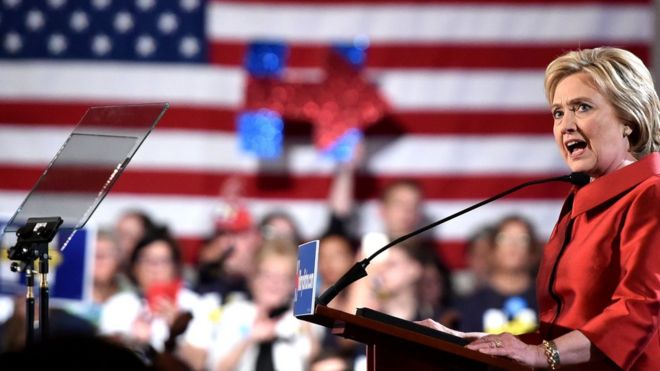 Getty Images
Getty Images
With the rise of social media, it's easy to feel immersed in the primary races for US President. But as Kim Ghattas found when reporting on Hillary Clinton, there's no substitute for travelling alongside the candidate.
The podium was ready in the opulent, carpeted ballroom at the Las Vegas Caesar Hotel and Casino. The Hillary Clinton campaign logo was affixed to the lectern.
The Democratic caucus was already under way across Nevada, but was the stage set for a victory or a concession speech?
The rally had been billed as a simple caucus day event. For days the Clinton team had been lowering expectations. Then barely an hour after the caucus closed, a tweet from Clinton herself: "To everyone who turned out in every corner of Nevada with determination and heart: This is your win. Thank you. -H"
Soon after, Clinton campaign staff arrived in the ballroom, hugging and embracing each other.
"Some may have doubted us but we never doubted each other," Hillary Clinton told her supporters. There had been doubt for weeks, from a razor-thin victory in Iowa on 1 February to a big loss in New Hampshire on 9 February.
But just like that, the mood in the Clinton campaign turned. So did the headlines.
Girls on the bus
Much has changed since Timothy Crouse wrote The Boys on the Bus, his now famous chronicle of the press corps' life on the 1972 campaign trail.
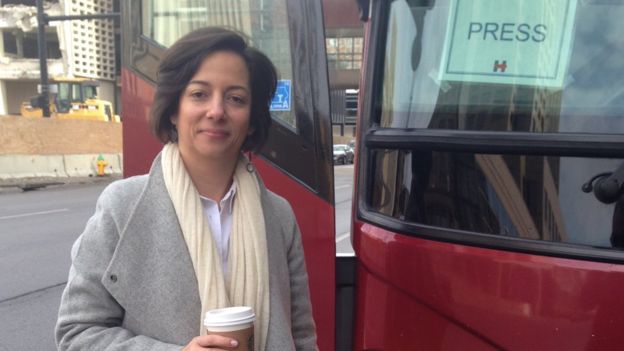
Women now dominate the press corps following Clinton. We carry laptops, not typewriters. There isn't always a press bus, and not everyone gets on. You can make your own way to events, and be notified of changes to the schedule by email.
Thanks to the 24/7 news machine and constant social media reports, anyone can follow closely and feel like they're in the bubble.
But there is nothing more dramatic than observing the facial expressions of campaign aides in person as they try to project confidence, and to watch the mood turn when things feel like they're slipping away or when victory is within reach. Or when insiders admit they were in the dark until the last minute.
Until Fox News called it [for Hillary Clinton], we had no idea what to expect," campaign communications director Jennifer Palmieri told me in Las Vegas. "HUGE" sigh of relief, another aide wrote to me in an email
Six months ago, Clinton was the prohibitive favourite. She led in national polls, she led in Iowa. And then Vermont Senator Bernie Sanders turned out to be a tougher challenger than anyone expected.
The bubble vs the trail
Some of Mrs Clinton's current aides were there during her 2008 campaign and followed her to the State Department, which is where I met them.
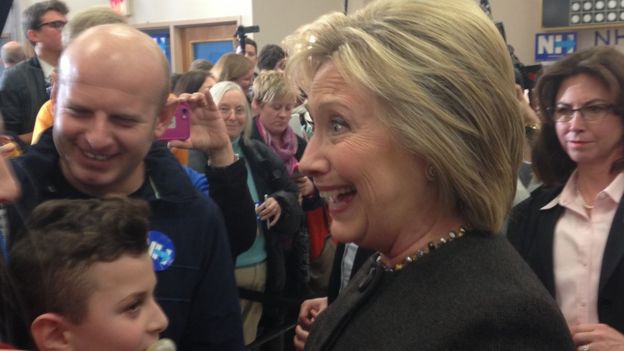
I used to cover the State Department, travelling thousands of miles around the world on then-Secretary Clinton's plane, riding in her motorcade, and waiting for her at press conferences.
The logistics of our travel were all organised by the State Department, from hotel bookings to transportation to going through customs. As a small press corps, we had regular access to Clinton and her aides on long plane rides or over dinner in world capitals. Jet lag was a curse, but it was all about high stakes diplomacy.
Now on a bus with only reporters except for one local campaign staffer, and on a separate charter plane than the one carrying Mrs Clinton, access is distant and different, more reliant on email or brief encounters with aides at rallies or set times for interviews. Hundreds of reporters are vying for access to all the candidates.
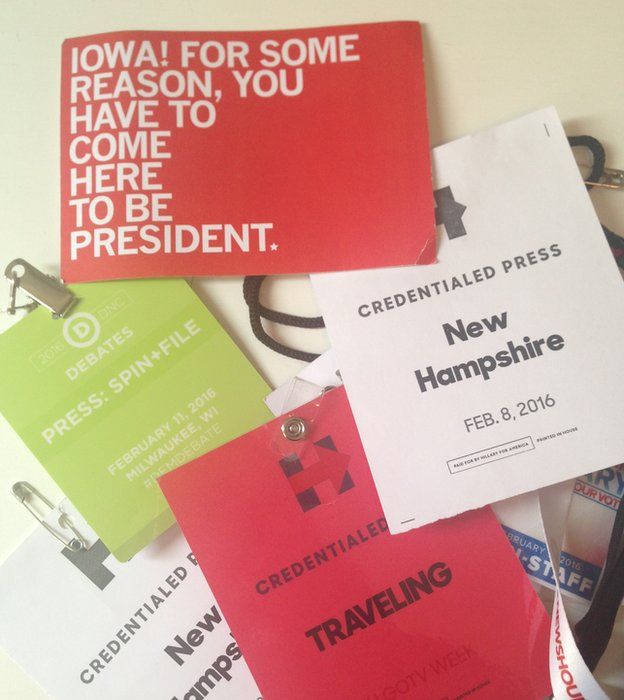
Clinton has given interviews to the US networks and to local papers. But she hasn't taken questions from her press corps in more than two months or spent time with them chatting off the-record.
The assessment of the campaign, rightly or wrongly, is that there's not much to be gained from more regular contact with reporters along the way, whose main focus are often the controversies surrounding Clinton.
So we rely on campaign aides or sources close to the campaign and long-time confidantes. It helps the reporting but dilutes the campaign message.
By the time I travelled to Iowa on 30 January, Clinton had already held 40 open press events that month alone. Every day, the emails came in: "Get the caucus out" events with Hillary, Bill and Chelsea, in Sioux City, in Council Bluffs, in Ames.
We were still in Iowa when the sign up emails for New Hampshire events started flooding in: Manchester, Dover, Derry. It feels like we're getting on a hop-on hop-off bus tour of America.
The days are punctuated by campaign events, the events punctuated by the set choreography, the weeks punctuated by the highs and lows on the trail, the mood of the campaign team and the spin of the political operatives.
And there is the drudgery of long drives, late nights writing and editing in non-descript hotels near an airport with brown carpeting, with no room service or food other than a snack dispenser in the hallway and barely a vegetable in sight for days.
The transition
Clinton's transition from diplomat back to candidate hasn't been seamless. When Clinton travelled around the world as Secretary of State, she represented the US. She spoke in a measured way with her counterparts and at press conferences, she never had to raise her voice to energise a crowd.
At university campuses and in town halls in world capitals, she was mostly welcomed with raucous applause. She didn't have to sell herself, she just had to sell America - not always an easy task either.
But in a political campaign, every person in the audience is a sceptic, every voter wants to feel special and every vote has to be earned. It requires a different skill set.
Clinton has taken to modulating her voice during events, using a low pitch when she wants to make a serious or emotive point, almost taking the audience into her confidence, and then raising it a few minutes later to project energy, ending on a forceful high as she promises to fight for everyone.
She has also had to transition from the high-brow language of diplomacy to the soundbites and glad-handing of a campaign.
The choreography
In Iowa and New Hampshire, almost every Clinton event played out according to the same template. As the crowd filled up the venue, music from the same approved playlist blared from the speakers. Sadly, it means I never want to hear Pharrell William's Happy again.
A screen or scoreboard would be lit with the numbers 45 - for 45th president of the United States - and 2016. When a video starts playing on screens that have been set up on the walls, you know Clinton is near.
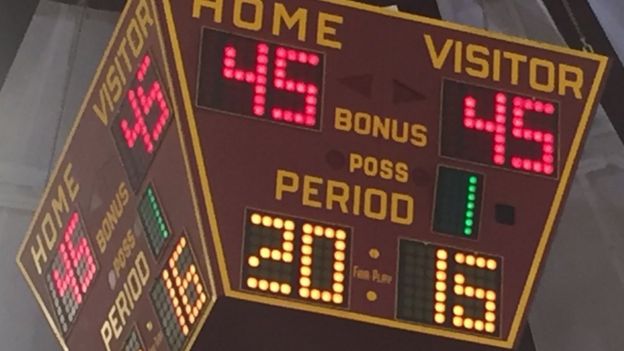
The short movie is a five-minute biography of the candidate, highlighting key moments: from her 1995 work for the Children's Defense fund to her speech in Beijing about women's rights, to her time as secretary of state.
It's an effort by the campaign to re-introduce Clinton to voters everywhere, and perhaps put some distance between her name and the issues that have been dogging her campaign, like the private email server she used at the state department.
But it's almost impossible to re-introduce a woman who has been in the spotlight for so long, and whom everybody believes they know.
The video gets a lot of cheers from the audience, but not everybody is impressed. Later in the campaign, in states like South Carolina, the campaign will start mixing it up, with hip-hop and R&B, town hall conversations with the mothers of victims of police and gun violence and more emotional campaign ads.
In Iowa and New Hampshire, a young organizer or campaign team member worked up the crowd and introduced a high profile surrogate, such as former Arizona Congresswoman Gabrielle Giffords, or a celebrity. Often it was her husband, former President Bill Clinton, or her daughter Chelsea. Clinton usually comes onto stage to the sound of Rachel Platten's This Is My Fight Song.
One of her campaign slogans is "Fighting for us". One of her campaign ads promises "real progress right now". It's not the stuff of dreams, but as EJ Dionne from the Washington Post says, Clinton is trying to sell "heroic realism" in a year where traditional politics have been upended. There's been more drama than the former first lady had anticipated.
The spin
It was about one in the morning when we finally piled into a chartered plane on a Des Moines tarmac, just a few hours after the Iowa caucuses. It's a tradition for all the candidates to make the dash to New Hampshire, the next contest, in the dead of night.
For a casual observer, the results of the Democratic race would have been stunning. The front-runner was barely ahead of the senator from Vermont whom people had barely heard of just a year ago. But for several weeks ahead of the Iowa caucus, the polls showed a dead heat with Sanders. The Clinton campaign was lowering expectations.
On stage that night, barely a point ahead of her rival, Clinton simply said she was breathing a sigh of relief. She had conquered the state that had frustrated both her and her husband in the past. But nothing was official yet, and the mood was one of confusion and forced optimism.
Keeping control of the narrative is key for any campaign, so before take-off, we in the press got a briefing. "We believe strongly that we have won tonight," said spokesperson, Brian Fallon. Frantic emails and tweets were sent.
We landed in Manchester at 0445 to cheers and clapping from the Clinton campaign in the front cabin. Their win had been confirmed.
When I spoke to people close to Clinton who had been in Iowa in 2008, I heard the phrase PTSD a few times. One source was in town the day ahead of the caucus but left before the results were even announced. They couldn't deal with a possible loss. Another flew into New Hampshire the day after Iowa to help surround Clinton with support and friendly faces.
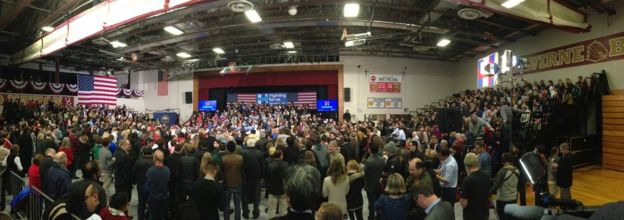
But despite reports of a shake up - a callback to the turmoil that plagued her 2008 campaign - there is no sign yet of internal upheaval, perhaps something Mrs Clinton learned as a manager of a big bureaucracy at the State Department.
Momentum and narrative
But there was one fight she lost. The disappointment in New Hampshire after Sanders defeated her soundly was big, and it was emotional for the Clintons. This was the state she won in 2008 after getting beaten in Iowa by Barack Obama. The state helped her husband become the comeback kid in 1992.
No-one expected a last minute victory but Clinton was hoping to close the gap with her rival. She didn't.
The campaign was poker faces all around.
"She doesn't like to lose but she expected it," Palmieri told reporters just before Mrs Clinton came on stage to concede defeat and declared she still loved New Hampshire.
But the tone was changing, the mood was tense, the attacks against Mr Sanders just this bit more acerbic.
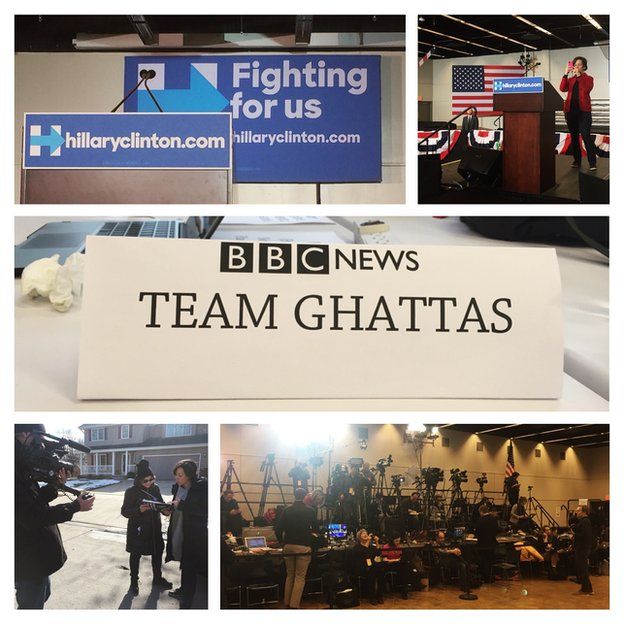
Mrs Clinton began honing her message. From "being a progressive that gets things done'' she started talking about being a candidate who wants to "break down all the barriers'', injecting a bit more poetry into her speeches, asking voters to imagine the tomorrow they can build together.
"I've seen worse weeks in the Clinton campaign," said Palmieri after the New Hampshire loss.
Two weeks and one caucus later, Palmieri declared the Nevada win the best day for Clinton so far. The race is not over. Mr Sanders remains a challenge, he believes he has the momentum, and will stay in the race as long as he can, if only to shape the conversation about money in politics, one of his core issues.
But Mrs Clinton now goes on to a series of easy wins in South Carolina and in some of the Super Tuesday states.
There will be more drama and headlines about Mrs Clinton's email troubles and speeches on Wall Street, but headlines about her prospects as the Democratic nominee will now slant in her favour.
- Why Hillary and Bernie both won and lost in Nevada
- Sanders taps into anti-Obama sentiment
- Bernie fans want 'bold ideas' not realism
- Is there such a thing as a 'black vote?'
- What's Hillary Clinton's next move?
- The billionaire v the socialist
- Hillary Clinton's problem with women
- Three things Bernie Sanders says
- Three things Hillary Clinton says
- Profile: Hillary Clinton
- The socialist candidate for president
- The full 2016 field
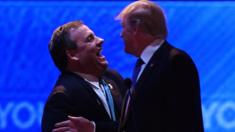

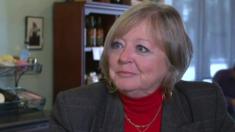



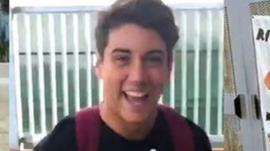







No comments:
Post a Comment
Please leave a comment-- or suggestions, particularly of topics and places you'd like to see covered